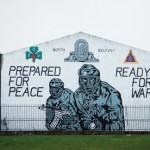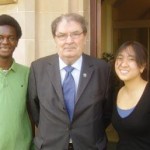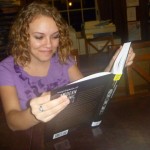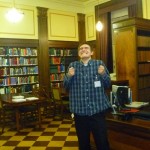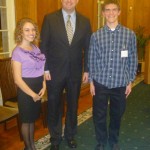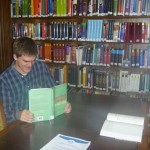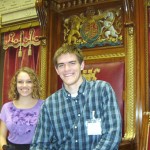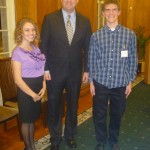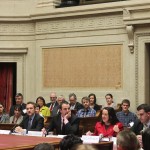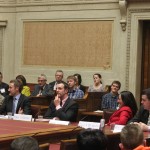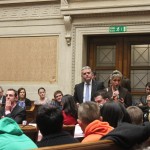11-22-11
Stormont, Scintillating Stories, and Super Shenanigans
^hooray for alliteration!
I was excited going into the day, because I knew it was the day that the youth from my community organisation were going to have their consultation at Stormont. Having dressed up a bit for this event, I felt a bit more at home visiting the incredible estate at Stormont, home to the NI government and I helped set up without feeling terribly out of place like I did earlier, when I toured the estate with the youth group. I had literally NO IDEA what to expect, having not seen any of the questions that the youth had come up with. The goal of the session was linked to what we did the first day at the consultation we did where we were staying, with the youth forum, when we discussed the issues that affected the youth with them and brainstormed a list of questions, issues, and policies. The youth had since met multiple times and done a significant amount of work on the questions, distilling complex issues down into factually based, concise, compact, compelling and challenging questions. The process I had not seen, I had been busy with other stuff and wasn’t really involved, but in retrospect, I recognize that there was a substantial effort and thought put into it, and I can only imagine the logistical headwork behind this event.
Speaking of logistics, I got to glimpse the genesis of the project, or at least hear the story from the perspective of the youth, which was amazing, inspiring, and empowering. I had previously only heard bits and pieces of the story, and only from the Bytes staff, who are awesome, but only described the process as observers. To hear the youth describe it for themselves was incredible! I was struck by the raw passion, emotion, and anger that they had (though all were constructively applied, so no worries!). They were frustrated about an issue, then realized that there were several other interlinked issues affecting their community, and had decided to do something about it. They gathered more than 6000 (!!!) signatures on a petition, so that they could come before the assembly and have their voice heard. They had worked incredibly hard, and you could tell that it had a significant effect on them, they were incredibly glad to have it come to fruition.
A bit of background the youth had originally come together over an issue affecting them in the community, specifically, the mental health of youth in the area, their friends and the community at large was very poor. Suicide was frequent, and rising. This frustrated the youth; and the lack of counseling services, someone to talk to, and a substantial amount of substance abuse and other circumstantial factors only worsened the situation which they found themselves in. They decided to band together as a support group in their community, which was very successful. The organization they set up had gotten multiple grants from the O2 Think big competition, and was widely regarded as a good influence in their community. This allowed them to get the reputation necessary for an audience with Stormont politicians, and they worked with [the community organizations that I had been placed with] (since the youth had all come from [my community organization’s] centers around the Belfast area) to organize the meeting.
I had no idea what to expect, having never done this sort of thing before. I admit I was somewhat apprehensive, given recent goings on in the center I was working in (example, someone lit up a joint in center the other day…much to the annoyance of the staff I was working with, we worked together to creatively diffuse the situation, but ended up closing early that evening.). The difficult thing for me was to bracket those concerns, and then focus on the issues and challenges at hand. Much to my surprise and pleasure, the youth were on their best behavior and took full advantage of this valuable opportunity. This made me quite joyous, since I’ve been confident for quite some time that the youth are very capable, and this gave them a chance to really prove themselves! They Did so with flying colors, (ok, bad metaphor, here in NI that means different things….so suffice it to say they rocked the place, with piercing pointed questions cutting straight through the political firewalls),
As I sat there listening to the youth wax eloquent on the issues that affect them (primarily mental health, homelessness, lack of funding, education, crime and punishment, juvenile justice, suicide, in addition to many more) , I was struck by how passionate and personal their responses were. The questions were very much their own, though they were crafted with [my community organiazation]’s help (how much, I don’t know. But there were VERY personal responses, and they struck a strong emotional chord with me. I empathized with the youth, and they were significantly effective with politicians as well, calling them out when necessary, crafting compelling, challenging, even borderline snarky responses when the politicians attempted to dodge questions. They were very honest, holding out their opinion respectfully, but firmly. The politicians, for the most part, responded in kind. I was VERY struck by some of their responses…but more on that later.
Constantly, thoughts kept running through my head, faster than I could control them. My emotions galloped up and down on a roller coaster. I felt enthused, passionate, frustrated, and elated all at the same time. My policy-minded side was on fire, my brain buzzing vividly with thoughts, like hundreds of bees, all in response to the stimuli I was picking up. Every time politicians responded, responses flooded my head, while I was still listening. It was bizarre; I never felt such a powerful presence of civic engagement and empowerment. The youth were absolutely impressing me, beyond my wildest dreams and expectations. I remember thinking to myself during the session “THIS is what it’s all about, civic engagement, taking your passions to the debate floor, your issues to community leaders, holding them accountable, and taking practical action in response to very real problems!”
I was floored by the sheer sense of engagement in the room. Everyone there wanted to be there, was 100% present, no checking out (at least that I observed) as is so common with youth in a normal session of a Bytes program. There was a powerful force in the room, one that I’ve rarely observed. It was the power of representative democracy at its purest, where youth themselves take control of their own political potential, and bluntly tell the politicians like it is in their community. It was done very respectfully, with titles, and formalities. There were not shouting matches, or even partisan bickering (the wonderful facilitator made sure of that, I was continually impressed with his ability to keep participants on track, formulate follow up questions and get counter-responses, and feedback. Save one annoying detour at the end as a formality, I was extremely happy he was doing that job, and which did so free of charge). The potential in the session was enormous, I was happy to see how it was done, and I look forward to hearing about the practical change being done as a result.
Right, enough about my feelings about the session, now it’s time for some details! In attendance were 5 MLA’s, from the DUP, UUP, SDLP and SF, and the minister of Justice, as well as Deputy First Minister Martin McGuiness (who amusingly commented “it’s my pleasure to welcome you all here. This is the place to ask the hard questions, and with that comment, I’ll now leave the discussion to the panelists”. He promptly left to go do other stuff, but I found it amusing…)
Budget issues, of course, came up. In this time of economic austerity everywhere, I have taken it for granted that there are cuts everywhere. And, maybe I’m showing my political ideology here a bit, but I know that some cuts aren’t going to be fun, but have to be made anyways. However, the partisan rhetoric evidence was very much present here, whenever funding cuts came up, they avoided the topic like the plague, but when pressed, presented talking points on ‘well, this actually ‘saves’ money’. Yeah right….I felt tempted to scream “I KNOW that there need to be cuts. I UNDERSTAND!! I even AGREE!! But, the question is WHAT cuts, WHERE, and WHY!!! Separate the ideology! Weigh the costs and benefits! The cliché phrase ‘An ounce of prevention is worth a pound of cure’ is VERY relevant here. If the community orgs are better organized and know the community-on the ground info BETTER than the politicians, they are more efficient! Certainly, they should be held to the same standards regarding results, but hey, isn’t like there Is a compelling reason for cutting funding from one of the most effective (in my experience) sectors in existence, especially when it could potentially save ENORMOUS amounts of money.
Another theme was that of accountability. There are lots of promises made, but not always kept. The youth made a point that there is a need for transparency, themes I’ve seen become nearly universal in politics. This includes back in the States. Really, a lot of the stuff the youth discussed could be extrapolated and put into a context outside NI. The US is facing a crossroads, with a significant amount of changes coming their way, and I hope for the best, but also know that it will be difficult. The amount of frustration with politicians was clearly evident in the room, the community certainly wanted change and a receptive audience, capable of taking action on the policy level.
At the same time though, I saw politicians who seemed very genuinely to want feedback, to want the community to communicate, who wanted to work with people to get things done (noticeable absent in the states….). Despite the noticeably strong opinions, and very real ideological differences, there was a genuine desire to give back. Many of the politicians had themselves come from disadvantaged socioeconomic backgrounds, and they understood the concerns the youth were talking about because they had experienced them firsthand. I really appreciated this, though it was difficult to tell whether their actions had matched their rhetoric, since I’m not done with my research yet and I don’t follow NI politics to a larger extent enough to know. Even so, I was happy to see that things are getting better politically, despite the seeming disconnect between political bodies, and the community. There are many politicians genuinely trying to make a difference, and for that, I give them immense credit. This is certainly great progress from the not so distant past, where it would be difficult if not impossible to even get them to sit down and the same room as each other, so it was cool to see the progress that has been made.
I remember talking to the participants, many were somewhat nervous/intimidated, and I now understand what that’s like! I don’t mind talking to politicians, but socializing with them afterwards was somewhat awkward, though I did get to meet the American consulate general, which was cool. It made me feel in a different context some of the awkwardness/intimidation of the participants. The specific feeling was hard to describe, but I would put it somewhat as a ‘fish out of water’….since it’s a fairly foreign context. Still though, it was a good experience, and I think the youth enjoyed it as well. From what I gathered, they felt as though their voices were heard, and they took full advantages of the valuable opportunity. I, for one, consider that a success!


